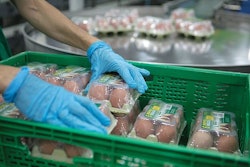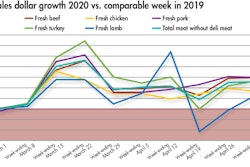
Egg producers from the U.S. and U.K. shared their experiences with the business disruptions caused by the novel coronavirus at the International Egg Commission’s COVID-19 - The opportunities and challenges facing egg producers webinar, held in mid-May.
Speakers from both countries noted that the challenges initially hit their operations hard, however, careful management, communication and close working relationships have allowed them to keep their businesses running, even resulting in some positives.
Rose Acre Farms
Greg Hinton, vice president of sales with the U.S.-based Rose Acre Farms, explained that the first stay-at-home orders in the U.S. resulted in demand for eggs spiking by an average of 200% as consumers emptied retailers’ shelves.
This huge increase resulted in Rose Acre Farms rationing supplies to its customers to ensure that all achieved at least some eggs. This was followed by supermarkets restricting how many eggs each customer could buy, which at least meant that shelves could be filled.
While some supermarkets are still imposing restrictions, Hinton explained, this issue has now largely been overcome. There are plenty of eggs available, especially given the drop off in foodservice demand. A lot of egg breakers for this sector did not have a way of packaging eggs for supermarkets, which took a while to resolve.
Fragile supply chains
There are now, however, difficulties in sourcing cartons, and this could continue to year end. Hinton continued that whatever carton manufacturers produce is immediately sent out, there is no inventory held. Rose Acre, for example, now has to place orders 10 weeks in advance.
If a couple of carton plants have to close for a day, for example to conduct a deep clean in response to an infected staff member, he explained, there are now major implications. Fortunately, there have been no major shutdowns, but a small hiccup in this sector can now cause major problems.
To help counter these supply issues, some companies have asked is they can sell loose eggs. While this is not standard practice in the United States, some states have been willing to let it happen.
On a positive note, Hinton said that the now weekly or daily communication with suppliers has strengthened relationships, adding that, as tragic as the COVID-19 situation is, long-term there will be stronger supplier and customer relationships, particularly as everyone has pulled together to confront the crisis.
Robust controls
Operations on farm and at packing stations have changed. At farm level there is now temperature monitoring for all employees and the use of face masks has moved from voluntary to compulsory. At packing stations there is regular cleaning throughout the day and additional cleaning at night. Social distancing can be challenge in packing stations, Hinton noted, and so plexi-glass panels have been installed between packing lanes. Plexiglas dividers have also been installed at breakroom tables so that each user has a protective cubicle.
Staff must now inform the company if they, or a family member, have COVID-19 symptoms. There are no penalties for being absent from work and monthly bonuses are paid for those who do come to work.
Hinton concluded that life will never go back to the way that it was – there will always be something – and social distancing measures will become the new normal. Looking at the broader market, he added that, with so many people working from home, there has been a rediscovery of home cooking and this is likely to continue. Where restaurants are concerned, it will take a few years to return to normal, he said. Quick service restaurants will be the first to return to a semblance of normality due to their drive-through operations, but it will take a good while for full service establishments to return to where they were.
Noble Foods
The experience of egg producers in the U.K. has been similar to that of those in the U.S. Veli Moluluo, managing director at the U.K.’s Noble Foods, noted that Noble had suffered problems with worker absenteeism which, at its peak, resulted in an absence rate of about 10%.
This difficulty was, in part, caused by the workforce’s diverse origins, with many workers looking to their home countries for information, rather than following U.K. COVID-19 guidelines.
Absent employees not only reduced worker numbers, but also resulted the loss of key skills. Noble’s operations are highly automated and the loss of key workers needed to keep them running caused additional issues. On top of this, there was also a surge in demand for truck drivers.
Various strategies were adopted to overcome these issues. The company already had established relationships with staffing agencies. As other businesses ceased operations, more temporary workers became available. To address its reliance on certain key workers, the company has trained others. To attract labor it has improved its family and friends employee finders scheme, and an exceptional bonus scheme was adopted to reward staff. Absenteeism has now fallen to 2-3%, which is normal for the company

Veli Moluluo, managing director at the U.K’s Noble Foods explained that one of the measures adopted by his company to confront difficulties was more training, as well as revising the company reward systems. (Courtesy IEC)
To address the shortage of truck drivers across the food industry a driver pool was set up by those companies supplying the food service sector, and Noble was able to access this.
Other difficulties included sourcing personal protective equipment, as demand from the health sector increased. Plexi-glass shields had to be installed at reception areas and at grader bed ends and these are now permanent in the packing sties and have acted to lift morale.
New health and safety protocols and workflows were developed and have been embraced by staff, while breaktimes have been staggered and breakroom seating reduced. The number of external visitors visiting Noble sites has been limited.
View our continuing coverage of the coronavirus/COVID-19 pandemic.


















